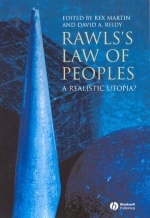
Rawls's Law of Peoples
Wiley-Blackwell (Verlag)
978-1-4051-3531-3 (ISBN)
RAWLS'S LAW OF PEOPLES A REALISTIC UTOPIA?
"Like his conception of social justice, John Rawls's vision of a just world has been the subject of heated debate, but its real strengths and weaknesses are becoming apparent only gradually. This excellent volume substantially advances that process, and will benefit anyone hoping to understand how one of the greatest political philosophers addressed some of humanity's most pressing problems." Andrew Williams, University of Reading
Rex Martin is Professor of Philosophy at the University of Kansas and Honorary Professor at Cardiff University. His most recent books are A System of Rights (1997) and a revised edition of R.G. Collingwood's An Essay on Metaphysics (2002). David Reidy is Assistant Professor of Philosophy at the University of Tennessee. He is the author of many articles and chapters in political philosophy and the philosophy of law and on Rawls in particular. He is the co-editor, with Mortimer Sellers, of Universal Human Rights: Moral Order in a Divided World (2005).
Notes on Contributors. Preface.
List of Abbreviations.
Part I: Background and Structure:.
1. Introduction: Rex Martin (University of Kansas) and David Reidy (University of Tennessee).
2. Uniting What Interest Prescribes with What Right Permits: Rawls’s Law of Peoples in Context: David Boucher (Cardiff).
3. Rawls’s Peoples: Philip Pettit (Princeton).
Part II: Cosmopolitanism, Nationalism and Universalism: Questions of Priority and Coherence:.
4. Cultural Imperialism and “Democratic Peace.”: Catherine Audard (LSE, UK).
5. The Problem of Decent Peoples: Kok-Chor Tan (Univ. of Pennsylvania).
6. Why Rawls is Not a Cosmopolitan Egalitarian: Leif Wenar (Sheffield, UK).
Part III: On Human Rights.
7. Human Rights as Moral Claim-Rights: Wilfried Hinsch and Markus Stepanians (Univ. of Saarland, Germany).
8. Rawls’s Narrow Doctrine of Human Rights: Alistair Macleod (Queen’s Univ., Canada).
9. Taking the Human Out of Human Rights: Allen Buchanan (Duke Univ., USA).
10. Political Authority and Human Rights: David Reidy(University of Tennessee).
Part IV: On Global Economic Justice.
11. Collective Responsibility and International Inequality in The Law of Peoples: David Miller (Oxford).
12. Do Rawls’s Two Theories of Justice Fit Together?: Thomas Pogge (Columbia, USA).
13. Rawls on International Distributive Economic Justice: Taking a Closer Look: Rex Martin (University of Kansas, Lawrence).
14. Distributive Justice and The Law of Peoples: Samuel Freeman (Univ. of Pennsylvania).
Part V: On Liberal Democratic Foreign Policy.
15. Rawls’s Theory of Human Rights in Light of Contemporary Human Rights Law and Practice: Jim Nickel (Arizona State University College of Law).
16. A Human Right to Democracy? Rawls’s Law of Peoples on Governmental Legitimacy and Humanitarian Intervention: Alyssa Bernstein (Ohio Univ).
17. Justice, Stability and Toleration in a Federation of Well-Ordered Peoples: Andreas Follesdal (Univ. of Oslo, Norway).
Index.
.
.
| Erscheint lt. Verlag | 3.4.2006 |
|---|---|
| Verlagsort | Hoboken |
| Sprache | englisch |
| Maße | 174 x 248 mm |
| Gewicht | 608 g |
| Themenwelt | Geisteswissenschaften ► Philosophie ► Philosophie der Neuzeit |
| Sozialwissenschaften ► Politik / Verwaltung ► Politische Theorie | |
| ISBN-10 | 1-4051-3531-X / 140513531X |
| ISBN-13 | 978-1-4051-3531-3 / 9781405135313 |
| Zustand | Neuware |
| Haben Sie eine Frage zum Produkt? |
aus dem Bereich


